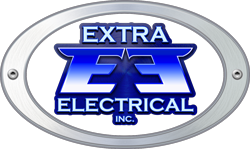- 8550 N 91st Ave building C Unit # 31 Peoria, AZ 85345
- info@extraelectrical.com
Who We Are
Learn more about Extra Electrical
About Extra Electrical
Frequently Asked Questions
What is Extra Electrical?
Extra Electrical is a licensed Phoenix-based electrical contractor offering residential and commercial services, including repairs, installations, inspections, and proactive maintenance plans.
Are your electricians certified and insured in Arizona?
Yes. Our team is fully licensed, bonded, and insured in accordance with the Arizona Registrar of Contractors (ROC).
Do you serve both homes and businesses?
We serve residential properties, commercial buildings, multi-unit housing, and industrial facilities across the Phoenix metro area.
What areas do you service in Arizona?
We primarily operate in Phoenix, AZ, but also service surrounding areas including Scottsdale, Mesa, Chandler, Glendale, and Tempe.
How can I contact Extra Electrical for a quote?
You can call us directly, fill out our online contact form, or request service through our website. Response times are even faster for maintenance plan members.
Our Electrical Services
Freqently Asked Questions
What types of electrical work do you handle?
We handle electrical panel upgrades, wiring, outlet and lighting installs, surge protection, smoke and CO detector maintenance, inspections, and code compliance.
Do you provide emergency electrical repairs?
Yes. Emergency repair services are available with priority access for enrolled maintenance plan members.
Can you upgrade electrical panels in older homes or commercial buildings?
Yes. We specialize in upgrading outdated panels to ensure safety and code compliance, especially in older properties across Phoenix.
Do you offer surge protection services?
Absolutely. We install and test whole-home and commercial-grade surge protection systems to shield your electronics and equipment.
Are your services compliant with Arizona building codes?
Yes. All services are performed to meet or exceed NEC and Arizona state code requirements, ensuring compliance and safety.
General Electrical Questions
Get expert answers about panels, circuits, lighting, and system safety.
For Homeowners
Explore answers about electrical upgrades, repairs, and safety in your home.
Residential Maintenance
Freqently Asked Questions
What’s included in the Extra Assurance Plan for homeowners?
This plan includes annual or bi-annual safety checkups, free trip charges, smoke/CO detector testing, panel servicing, surge protection testing, and repair discounts.
How much does the residential maintenance plan cost?
Choose between $59/month (2 visits/year) or $45/month (1 visit/year). One-time annual payments are $700 or $500, respectively.
Do you inspect smoke and carbon monoxide detectors?
Yes. We inspect, test, and replace batteries in all smoke and CO detectors during your scheduled maintenance visits.
What are the discount tiers for repair work?
Can I cancel the maintenance plan without penalty?
Yes. Our plans are month-to-month with no long-term contracts. A 30-day notice is all that’s required for cancellation.
Commercial Maintenance
Freqently Asked Questions
What services are included in the Extra Mile Plan for businesses?
This plan includes quarterly inspections, load testing, thermal imaging scans, surge protection checks, power quality analysis, and emergency response guarantees.
Is the commercial plan customizable?
Yes. We provide tailored service tiers—Basic, Standard, and Premium—based on facility size and operational complexity.
Do you offer electrical safety training for business staff?
Yes. Our Premium Tier includes annual on-site staff training on electrical safety and troubleshooting basics.
Can you support multi-location commercial properties?
Definitely. We service and manage maintenance plans for multi-site businesses and property managers across the Phoenix metro.
What kind of businesses benefit most from the Extra Mile Plan?
We work with healthcare facilities, warehouses, retail spaces, offices, schools, and hospitality venues requiring dependable power and safety compliance.
For Businesses
See how we support Phoenix-area commercial properties with reliable electrical solutions.
